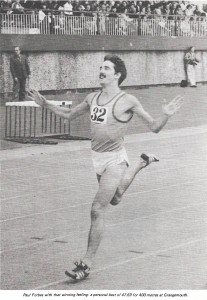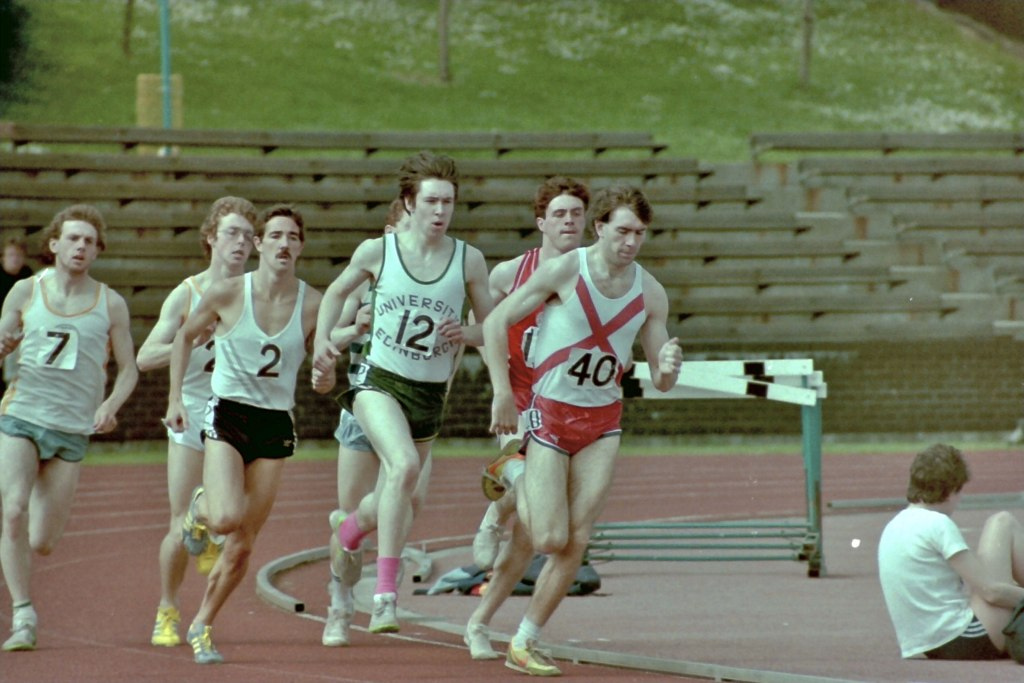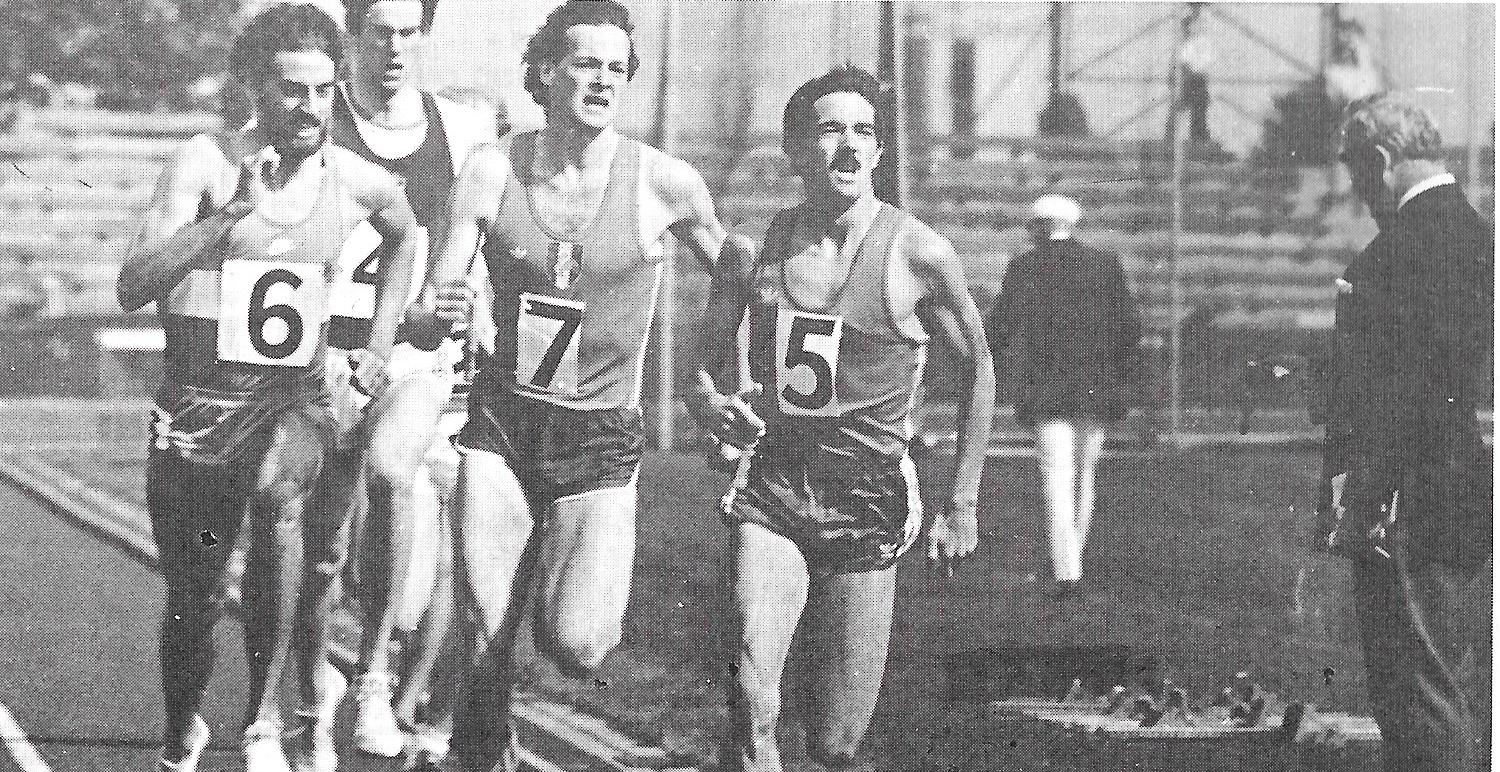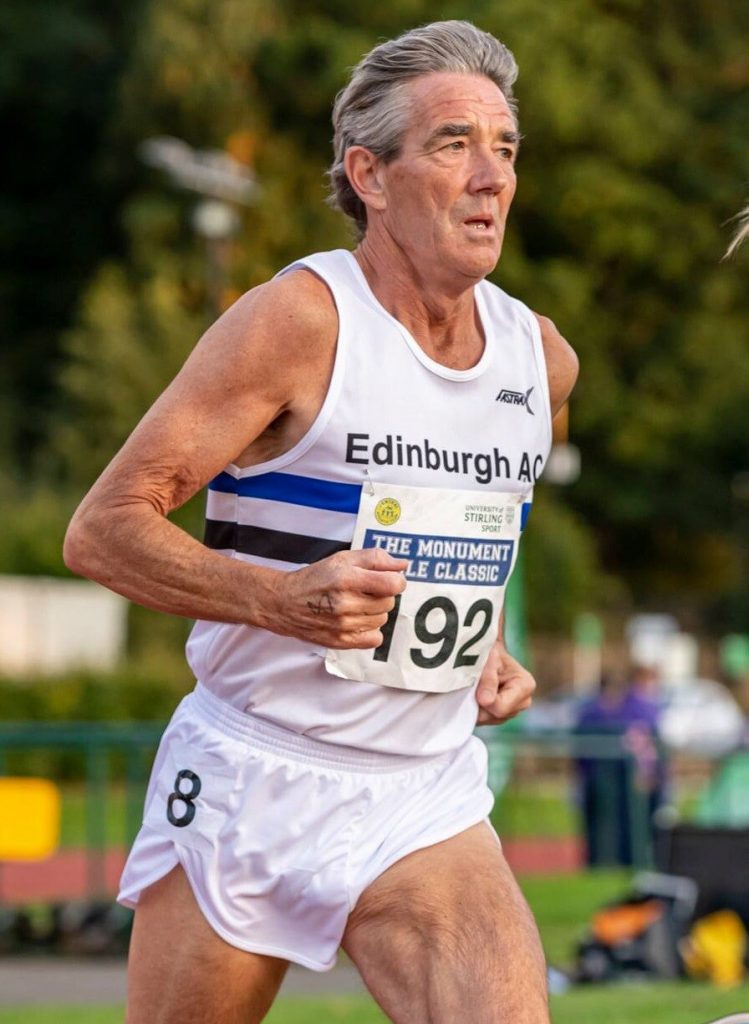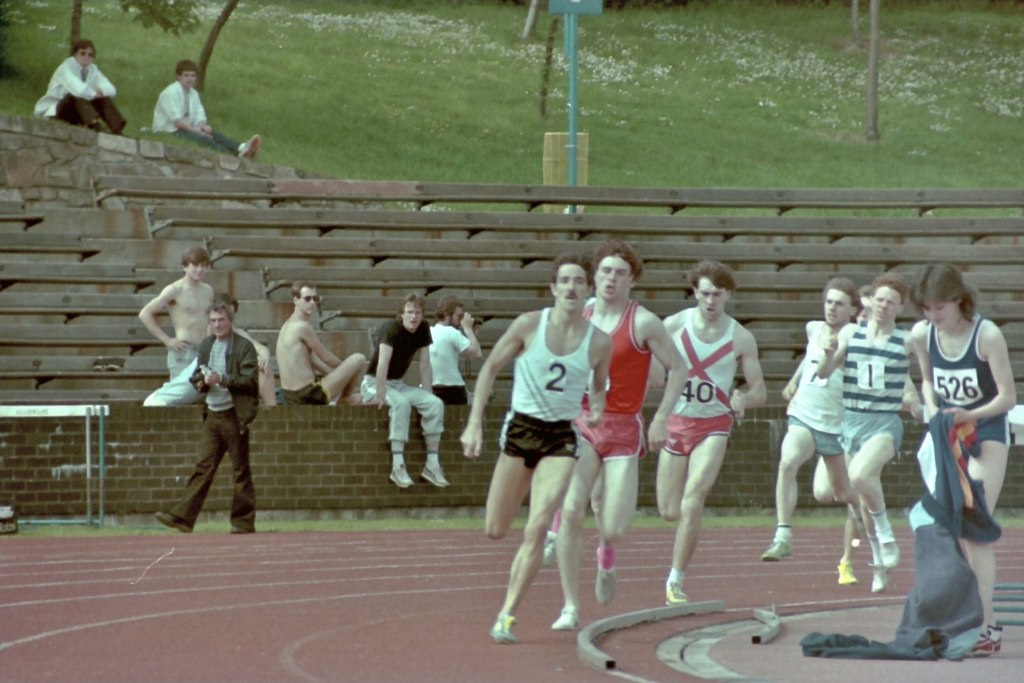 Paul Forbes, number 2, leading Tom McKean into the back straight at Meadowbank
Paul Forbes, number 2, leading Tom McKean into the back straight at Meadowbank
Photo from Alastair Shaw
Paul Forbes is a name not well known among the young athletes and their coaches of the twenty first century – buit it really should be. Look at the Scottish all-time rankings for his best distance, the 800m:
- 1:43.88 Tom McKean 28 Jul 89
- 1:45.47 Brian Whittle 20 Jul 90
- 1:45.6 Graham Williamson 12 Jun 83
- 1:45.66 Paul Forbes 8 Jun 83
- 1:45.76 Frank Clement 10 Jul 76
- 1:45.81 David Strang 12 Jul 96
- 1:46.4 Paul Walker 22 Jul 97
- 1:46.63 Peter Hoffmann 11 Jun 78
- 1:46.65 Guy Learmonth 21 Jul 15
- 1:46.8 David McMeekin 6 Jun 74
There he is. Fourth behind McKean, Whittle and Williamson and in front of several better known names such as Clement and McMeekin with today’s top Scot Guy Learmonth almost a full second behind him. He ran in two Commonwealth Games and won medals at Scottish and UK Championships and set records. His career should be better known than it is.
Paul, date of birth 20th November 1956, started off as a junior boy with Edinburgh AC being coached by Eric Fisher. Although Paul is best known as an outstanding track runner, at this point in his career he was a good cross-country runner and we should maybe look at his development through the ranks over the country. He was a successful cross-country runner right from the start, winning the East District Junior Boys Championship in 1969/70 and leading Edinburgh AC to team victory. The race was held at Grangemouth and having sprinted up the finishing straight to victory he kept on running till he reached Eric and said “We’ve done , we’ve done it!” That season he was also sixth in the National Championships in a field of 120 runners. In 1970/71 as a first year Senior Boy (Under 15) in the National Championships at Bellahouston Park in Glasgow, Paul was 58th finisher and fourth counter for the club team which finished third – at least he went home with a Scottish medal. He learned from this and the following year, ’71/’72, he was eighth in the District Championships in the team which finished second. The national saw an improvement on the previous year – but only a slight one and he finished thirty eighth in a team which was fourth, well behind Monkland Harriers who were third. He went up another age group in ’72/’73 but finished higher up the field in the District championship where he was sixth leading the Edinburgh AC team to first place. If he ran in the national at the end of the year, he finished well down the field, nor was the club team placed in the first three. As a second year youth in 1973/74, he moved up to fourth in the District championships, and the team won again: in his four years in these championships he had three team golds and one silver. In the national he finished eighteenth in a field that had many excellent athletes – Nat Muir, Graham Crawford, John Graham, Hammy Cox, Mark Watt and Graham Laing among them. At this point when he was due to move up to the Junior age group, he stopped running cross-country, although he did run in a few team events – the National Relays in November 1975 where he was in the EAC second team, and two good runs in the Edinburgh to Glasgow Relay (third stages in 1975 and 1976 – each time the team was second) he was destined to be almost entirely a track runner for the rest of his career. Eric Fisher had passed him to Bill Walker and it was with Bill that he trained from then on.
Summer 1974 was a very good one for first year Junior Paul. Running mainly 800m and 1500m and still at school, he was ranked top Junior in the 800m and won medals at both distances. His best 800m time was set right at the start of the year when at Bell’s Indoor Arena in Perth he was timed at 1:54.8 to win the event on 3rd February. The East District Championships were held at Meadowbank on 25th May and Pal ran in the Senior/Junior 1500m and finished third in 4:10.5 behind Paul Kenney (3:56.0) and Graham Laing (4:10.5) – you will note the close finish for second and third. The championship trail then led on to Pitreavie on 15th June where Paul, running for Forrester Secondary, won the 800m at the Scottish Schools Championships in 1:58.0, half a second quicker than Alistair McLaughlin (Knightswood HS and Garscube Harriers). Only one year earlier Paul had won the Group B 1000m steeplechase at these same championships so it was his second gold medal in succession. In the Scottish Junior Championship at Meadowbank, Paul had another good run but had to settle for second place to John Fleming of Springburn who won in 1:55.9 to Paul’s 1:56.5 with John Robson third in 1:57.9. At the end of the season his time from Perth away back in February led the junior rankings and placed him sixteenth among the country’s best seniors.
*
In 2017, Paul Forbes (still EAC) made a surprise come-back in the M60 age-group, after running many Parkruns, with a 5k in 18.19 and 10k in 39.34. Then he raced cross-country. In 2019, he returned to the track, finishing a meritorious 6th (2.20.24) in the World Masters Indoor Championship 800m in Torun, Poland; as well as winning 800m events in the English Inter-Area Challenge and the Scottish Masters Championships, where he improved to 2.17.22. In 2020 Paul won Indoor M60 800m titles in both Scottish Masters and British Masters Championships.
Then he broke a World Record!
Athletics Weekly reported:
SCOTTISH VETERAN AND THREE-TIME COMMONWEALTH GAMES COMPETITOR SMASHES M65 INDOOR MARK WITH 2.15.30.
GLASGOW 12’S FUN DAY & GLASGOW AA YULETIDE OPEN GRADED MEETING, DECEMBER 18TH 2021.
Almost 40 years since he reached the 1982 Commonwealth Games 800m final (a feat he repeated in 1986), Paul Forbes broke the World M65 indoor 800m record with a 2:15.30 clocking.
The time is half a minute outside his lifetime best – 1:45.66 set in Florence in 1983 behind world silver medallist Rob Druppers’ 1:45.12.
Forbes began as a cross-country runner and won the Scottish East District Junior Boys Championships in 1969 and he was sixth that season in the Scottish Championships. In 1973 he won the Scottish Schools 1000m steeplechase title and then won over two laps in 1974 in 1:58.0.
In the Scottish Under-20 Championships, he was second in 1:56.5 but ahead of future Commonwealth Games 1500m medallist John Robson and in 1975 he won the AAA Junior title in 1:50.1 and made the European Junior final that year in Athens where he placed eighth.
Forbes won the UK title in 1982 in a championship best 1:46.53 narrowly ahead of Steve Caldwell (1:46.65) and Peter Elliott (1:47.76) and he also ran for Scotland in the 1978 Commonwealth Games where he was a semi-finalist.
After his successful senior career – spanning three Commonwealth Games – he had a complete break in his 30s before later returning as a Master and he was involved in a stunning battle with Alastair Dunlop in the Scottish Championships in his first major race as a vet with Dunlop edging home in 2:00.60 to Forbes’ 2:00.61.
After that 1997 race Forbes said he felt he was capable of a World Masters record if he could train seriously but the world record ultimately took nearly another 25 years with injury regularly scuppering his ambitions.
He competed in the European masters 10km as an M45 in 2005 and ran a few other Masters road championships before eventually re-focusing again on the track.
He made another comeback as a M60 – finishing sixth in the World Masters 800m at Toruń in 2019 and winning the Scottish and British Masters indoor titles in 2021 at the age of 64 – but it was turning 65 in November that gave him the opportunity to make a real mark in the Masters.
The previous best was held by Ireland’s multiple world age-group champion Joe Gough with 2:16.65 in Dublin in 2018.
Forbes’ 2:15.30 is his fastest in recent years, equalling his outdoor best of 2021 and is even faster than the outdoor UK M65 best.
The Scot’s run took an astonishing nine seconds off Pete Molloy’s UK indoor best of 2:24.48 set in 2014 and is even fractionally quicker than Dave Wilcock’s M60 UK indoor record of 2:15.60.
Then, in mid-February 2022, Paul missed (by less than a second) breaking the 1500m M65 Indoor World Record but, a few days later in London, smashed the One Mile M65 Indoor World Record, which had been held since 2008 by American Frank Condon with a time of 5.11.43. Paul ran a tremendous 5.04.2! Shortly afterwards, in Braga, Portugal, Paul became the M65 European Masters Indoor 800m Champion (and also won a silver medal in the 1500m).
Paul commented in detail about this achievement and the training which led up to it.
“I am delighted with the record but I think the real achievement was in the preparation for having a crack at it.
Using a sub 2.16 800m as a target, I planned the training backwards from the race (late December) to the beginning of October. Having a great group to train with and staying injury-free meant that we could train consistently and progress to plan, which is both a psychological and physiological fillip. Like all the events in our sport, run, jump or throw, competing is far easier than the input required to get to the point of competition. A successful outcome is a culmination of planning, technical nous, support and hard work. Getting that right is the real achievement.
As for getting fit after a long lay-off, well, it wasn’t easy! After an operation to put a broken ankle together, I decided to try using the parkruns as a way back into getting healthy. I was quite happy plodding along at 25mins and losing a wee bit weight. I then came across a couple of guys from back in the day – they were running 20/21. I wasn’t having that! I started doing a couple or runs during the week and a parkrun at the weekend. As I dropped the weight, I gained momentum and the wee flame I carried in my memory started to burn.
After a year or two dabbling with the roads, I went to watch the World Masters in Spain. I ran a 40 min 10k out there but, watching the track races, I knew that that was where I should be putting my energy. I went back on the track in late September and by the early March I had run 2.20 indoors.
A lot of thought went into my track work. I couldn’t run as many sessions as I used to, since injuries were frequent and taking a lot longer to heal. I moved to a ten-day cycle, rather than the traditional seven days – this gave me more time to rest between the three sessions that I needed to do.
These sessions were along the lines of a 5k tempo run, a miler type session and a 400m type of workout. ALL of these sessions were run at a moderate to hard pace but staying within the bounds of my aerobic capacity (I still train like this now). Each training session was now being run on relatively, fresh legs which helps to keep the tempo high. Generating speed was never a problem for me. I’m convinced that, like an aerobic or speed endurance base, it’s possible to hold a speed base also. (At any one time of the year, I can turn out a 60-62 second 400 after a few days of speed work.) All the running I do is designed to get me to the next session. I never knock myself out in training (racing is a different matter) I don’t believe there is anything to be gained by training to failure.
Coming back into the sport has been the best move I’ve made for a long time. I’m enjoying my life immensely at the moment. When I run against the youngsters, I feel I’m racing the future. I get a kick out of being asked my opinion on their training or advice on a particular discipline. My perspective on growing older has changed also. Not the part about growing old gracefully though, I have no intention of doing that!”
“Scottish veteran Paul Forbes smashes 800m World Masters record”
Those who were surprised at Paul’s record had obviously not been paying attention to the previous season’s track running. To run so fast and to train so hard as a 60+ veteran can only be done if you really love the sport. You need to train regularly over a long period and you need to race frequently. To see how hard Paul trains, have a look at this video which was made after he became the fastest man in history over 800m in his age group –
Paul Forbes – Track Session (Bonus *Masters* Episode) – YouTube
This all speaks of a man who loves the sport. Many leave the sport when they have stopped being competitive in open races. A runner knows when that time comes. Emmet Farrell said when he failed to make the British marathon team “I have shed my silk as a runner.” But he loved the sport and kept running until he was in his late 80s and even into his 90s. That was a love of the sport. Paul has a similar love of the sport. It is wonderful to see, and the question now is, what does the future hold for Paul Forbes … and for World Vets 800m records?
WELL, HIS SUCCESS CONTINUED.
“Edinburgh AC’s Paul Forbes continues to set the standard in masters track and field. The 67-year-old – who won world and European titles in 2022 and broke records from 800m to the mile in the M65 age group – has further excelled in 2023. He won double gold over 800m and 1500m at the World Masters Championships indoors and European Masters Championships outdoors. He also broke M65 world records in the 800m (2:13.74) and 1500m (4:39.15).
“It’s a bit of a thrill, I must be honest with you,” says Forbes when told he’s been voted by AW as the British Masters Male Athlete of the Year for the second successive year. “They’ve made an old man happy.”
In February 2024, World Masters Athletics (WMA) announced that Paul Forbes, 67, of Great Britain was the 2023 Male Athlete of the Year.
What does it mean to you to be nominated for this honor?
Gives me the opportunity to express not only my gratitude to the many people who help me over the season, but for them also to be acknowledged by the wider athletic community. My small but successful masters training squad consists of Graeme Gemmell, Paul McMonagle and Laura Haggarty (all are masters finalists at European/world level), and each contribute to our collective success. It goes, almost without saying, that the nomination acknowledges the support of my wife Kim. A successful athlete in her own right, she is very supportive of all my endeavors.
What are your goals in Masters Athletics for 2024?
My goals remain remarkably consistent from year to year. My aim is to train and race to the best of my ability, What changes is my approach to each new season, planning a schedule to ensure improvement in my running, challenging myself over new distances, adapting my mindset to cope with any physical decline in speed or strength. These goals are set against and within a sustainable framework of physical and mental well-being. Something which is critical in today’s society and advancing years.
What Master/s Athletes do you admire and why?
I admire anyone with the willpower and determination to get out of bed each morning and try to make a difference, whether for themselves or for others. Positive attitudes, glass half full not half empty sort of thing. I am fortunate that through my active participation in Masters Athletics much of my time is spent in contact with such individuals.
What else would you like people reading the announcement to know about you?
Although past retirement age, I remain in employment as a part-time care and support worker for those more elderly and infirm than myself, I struggle to give up the satisfaction of the day-to-day interaction I have with my clients and I expect to be working for the foreseeable future. Much of my satisfaction these days comes less from my own achievements and more from my direct or extended family, along with my training group and a few other athletes I advise on an ad-hoc basis.
(In March 2024, Paul ran right away from the field to win the European Masters Indoor M65 800m Championship.)
..
